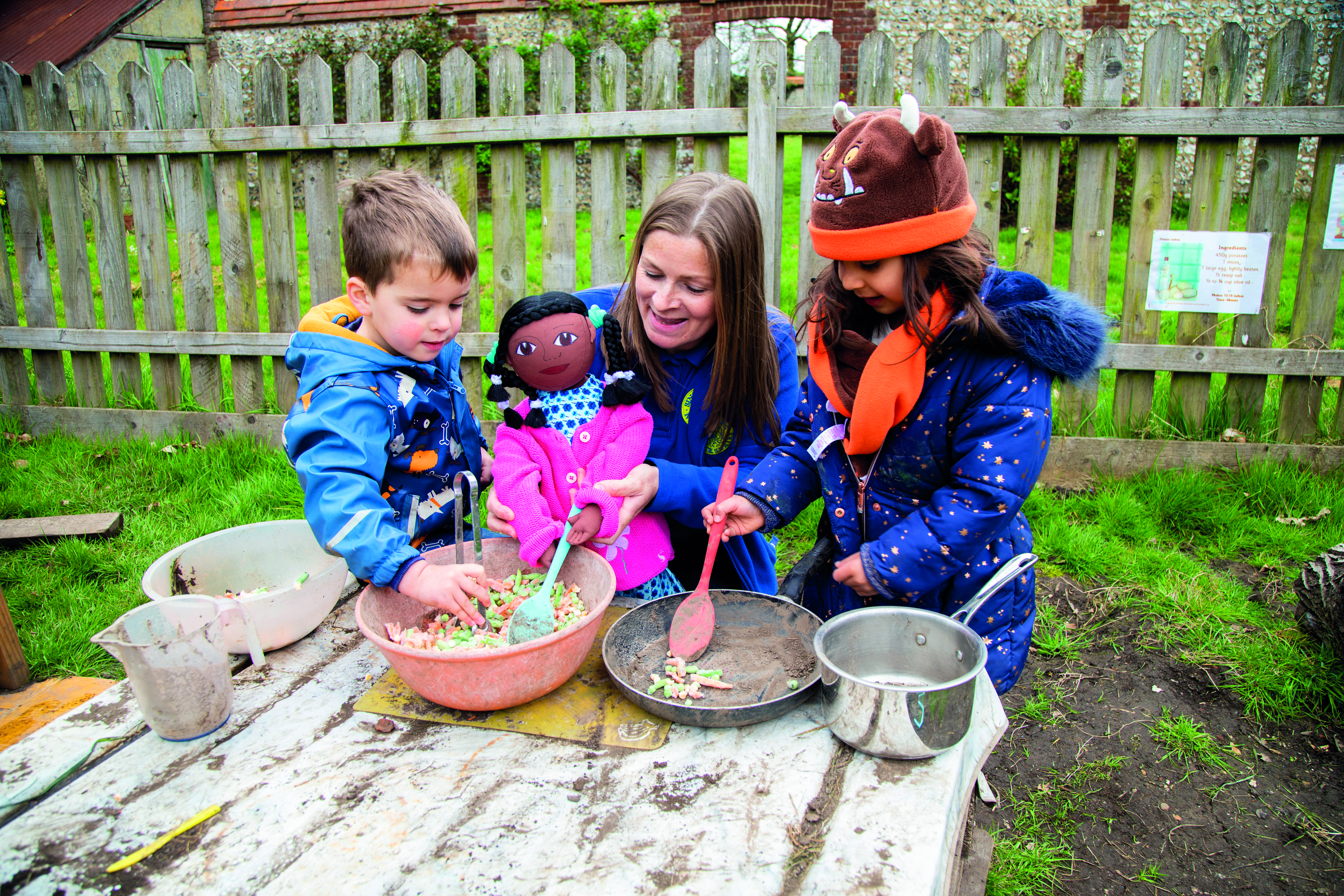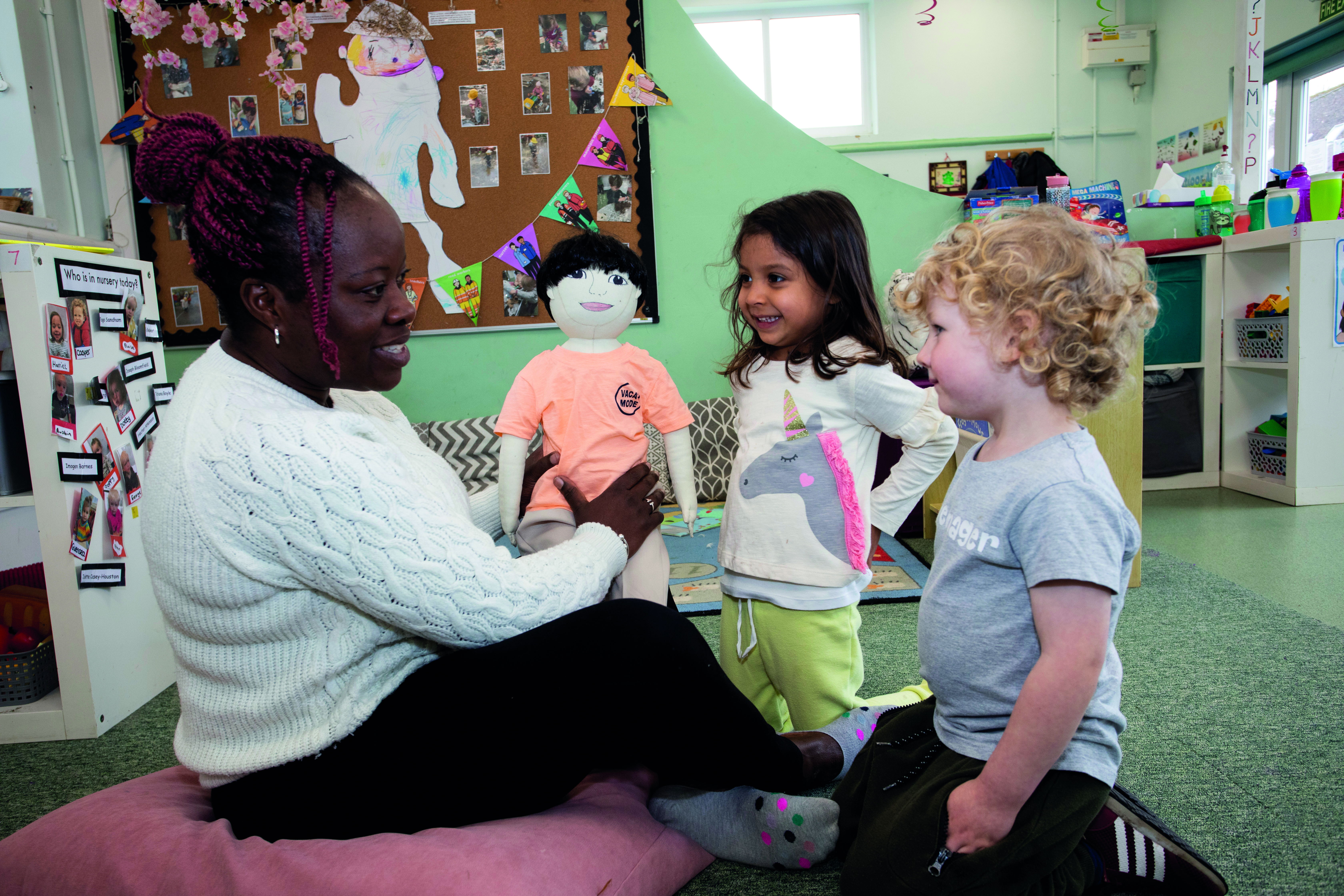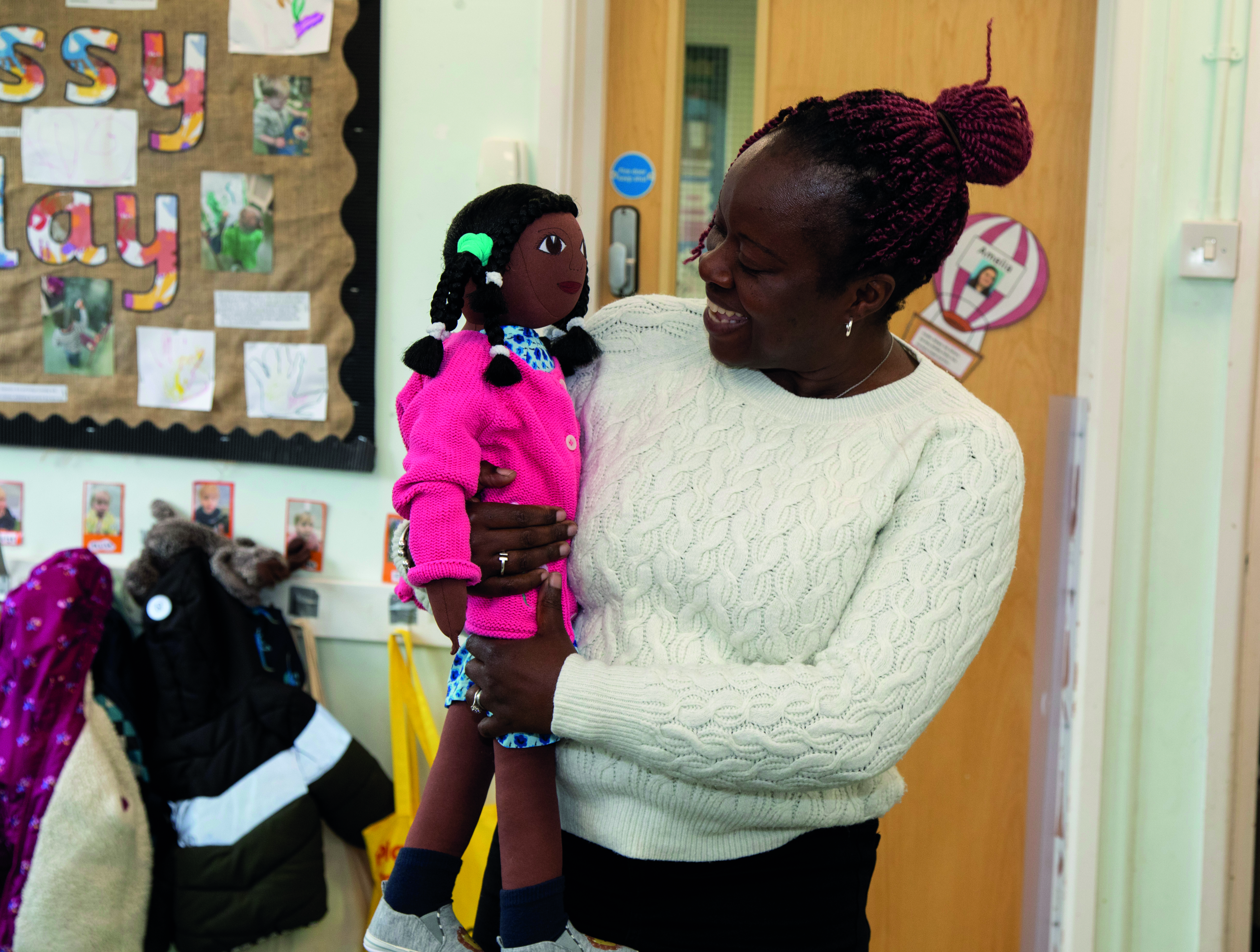
Persona Dolls and their stories are a practical and enjoyable way to celebrate diversity, help children develop a positive attitude to difference and challenge stereotypes and prejudice.
The approach involves a special kind of storytelling, using a child-like doll for which a ‘persona’ (unique identity and family background) has been created by the practitioners who will be introducing the doll to the children and devising the stories. The doll is not a toy, and is only used for the storytelling sessions.
PERSONA DOLLS AND THE EYFS
The 2021 EYFS statutory framework begins with the statement that ‘every child deserves the best possible start in life and the support that enables them to fulfil their potential’. This is something we all agree with, but the world we live in does not offer every child the same opportunities to be all they can be – very far from it.
Over the past couple of years, movements such as Black Lives Matter and #Me Too have made us increasingly aware of the depth of inequalities in the UK, and the need to embrace and celebrate human diversity and think seriously about what inclusive practice really means for children and families.
The Covid-19 pandemic has made this need all the more pressing with its unequal impact on families and the huge issues facing poorer communities.
The EYFS requires us to provide ‘equality of opportunity and anti-discriminatory practice’. The new Ofsted inspection framework (2021) takes this further. For example, to achieve an Outstanding judgement in Personal Development, ‘the provider goes beyond the expected and is highly successful at giving children a rich set of experiences that promote an understanding of, and respect for, people, families and communities beyond their own’.
WHY DO WE NEED TO TAKE EQUALITIES SERIOUSLY?
Ethnicity, gender, culture, language, social class, poverty, being a refugee or asylum seeker, LGBTQIA+, disability and/or learning differences can all become excuses for prejudice and reasons to discriminate or exclude. It may be hidden and unconscious, based on unquestioned, historical and ‘traditional’ attitudes and ways of doing things, or it may be overt.
Data for hate crime in England and Wales published in 2021 showed more than 124,000 such crimes were reported to the police, an increase of 9 per cent on the previous year. Nearly three-quarters of these (74 per cent) were racially motivated, with an increase in 12 per cent since 2020.
There was even a rise of 9 per cent in disability hate crime and 7 per cent in sexual orientation hate crime. Several instances would have had more than one motivating factor and many such crimes are not reported to the police.
The consequences of ingrained negative attitudes to some groups of people have a huge negative impact on all children and families. Children learn from everything around them, whether intended or not. They soak up everything – all they see and hear influences how they feel about others and themselves, negative or positive.
In a project run by Persona Doll Training involving a series of workshops for parents on equalities, one parent said that her child had tried to ‘wash his colour off’, and another parent reported that her dual-heritage child had said, ‘I want a mum who looks like me.’ Finding a really good way to raise equality issues and combat discrimination directly with the children is not easy. This is where Persona Dolls and their stories can really help.

PERSONA DOLLS TO THE RESCUE
Over the years at Persona Doll Training, we have found that the most common equality issues addressed through the dolls have been around gender stereotyping and gendered play, disability and special needs, welcoming new children, especially refugee and asylum-seeking families, ethnicity and racism, and family diversity, including same-sex parents. In addition, the dolls are used to support transitions and parents’ separating and divorce. In the past two years, the range of issues addressed has expanded to include children’s anxieties about health and the pandemic, bereavement, missing friends, and in particular raising self-esteem, building wellbeing and resilience. As one nursery teacher told me:
‘Many children are now talking about parents being unwell – even being very specific about it. Many have found it difficult to say goodbye at the nursery gate. As a result of prolonged periods of time at home, we often hear children using phrases such as “I am not your friend”. We are also noticing many children who are choosing to play on their own for longer periods of time.’
Another practitioner recently told me, ‘One thing that struck us was the impact using the doll had on one particular child who finds it so difficult to sit down at circle time. When the doll arrived, he was fascinated and wanted to sit next to him, sharing his own experiences and telling him stories. For the first time, we felt he was fully engaged and listening.’
Since the first Covid-19 lockdown, Persona Doll Training has been running training online. This has not only enabled more UK early years practitioners to participate, but those from across the world too. We recently provided online training to a group of counsellors working with children with cancer at Melbourne Children’s Hospital in Australia. To support the children going through treatment, they now have four dolls with no hair to use for their Persona Doll sessions.
CHALLENGING STEREOTYPES
It is important that the doll you use represents the range of human diversity, such as skin tone, gender, hair type, and is as childlike as possible – not a baby doll. The type of doll you choose and the persona you create should give you as many openings as possible for a wide range of stories challenging stereotypes and prejudices. If there is little diversity in terms of ethnicity in your area, for example, you may decide to choose a doll to represent diversity. Or you may want a doll to reflect a local minoritised community, suffering the brunt of prejudice and stereotyping, affecting the children’s self-esteem.
Ophea, owner-manager of Single Steps Nurseries in Hampshire, told me, ‘Our nursery is in a small village where there is very little diversity. I wanted to introduce greater diversity to the children so decided we would have a Chinese doll. We decided that Wang Lei would live in London in a high-rise block to introduce different living environments too. Wang Lei is very shy and it has taken him time to make friends at his nursery. He loves coming to visit us, talking about his favourite activities as well as his shyness and things that upset him.’
MAKING SENSE OF EXPERIENCE THROUGH STORIES
The story session becomes a safe space for discussion, helping the children to develop empathy and respect for others, and appreciate that name-calling, teasing and exclusion from play causes pain and unhappiness. Many of the doll’s stories need to be happy ones, demonstrating similarities between the doll and the children’s own lives, helping the children to reflect on their own experiences as well as bond with the doll. These help to raise the children’s own self-esteem, making links between their own and others’ life experiences, but they also ensure the doll is not seen as a victim.
Only some of the stories should be about social injustices or problems that the doll encounters, such as feeling lonely or excluded from play. These help children to see themselves as problem-solvers and critical thinkers, which in turn empowers them. Most commonly, the issues will relate to things that may be happening with your children, but it is important not to mirror this exactly, and, as it is happening to the doll, a reflective distance on any difficult event is created.

IMPACT ON THE CHILDREN– AND THE ADULTS TOO
Ophea at Single Steps Nurseries told me, ‘Nobody gets distracted when Wang Lei turns up. The minute he arrives, everyone is engaged, wanting to share something and to know what he has been doing. We have so many children now who are chatterboxes – some of the children who would never speak out before are now so engaged. When it is time for the circle time to end, some children move off, but others want to stay and chat to Wang Lei. If there is a new child, Wang Lei notices, helping the child to feel included, telling them how pleased he is to meet them.’
Parents are involved too. ‘Before we introduced Wang Lei to the children, we told the parents about Persona Dolls, why we are using them and how. The children talk a lot about him at home. We have a display about him and his family on the wall, and a book we have made about him too that the children can look at.’
Persona Dolls can have a very positive impact on adults too, helping us to address tricky issues we find hard to talk to children about, in turn building our own self-confidence.
As Ophea says, ‘Before having Wang Lei, I noticed that some staff were a bit reserved in talking about race and culture differences, but now they feel able to share our differences and talk openly and positively about them. This is his contribution to our setting.’
To find out more about Persona Doll Training, please visit the website: https://personadoll.uk
With thanks to all those quoted, in particular Ophea Waite Uden at Single Steps Nursery, staff at Holmleigh Primary School and Meeta and Robb Johnson.
Vicky Hutchin is an early years consultant. She has been the acting co-ordinator for Persona Doll Training since 2019.
Equalities
In the Birth to 5 Matters guidance (2021), you will find that the importance of equalities is threaded right through the document from the very first page.
The section on Equalities and Inclusive Practice spells out that real equality is not just about giving everyone the same opportunity but going further, taking note of difference and the uniqueness of every child and taking action to ensure that those who need more support receive it. Inclusion is a process of identifying, understanding and breaking down barriers to participation and belonging.
You will also find references to Persona Dolls in the sections on PSED and Understanding the World.
CASE STUDY: Chantalle – a story
 The staff in this nursery noticed that several children in the three- and four-year-old group tended to only play with children who were similar to themselves, especially in terms of gender, ethnicity and cultural heritage. A few children were finding it difficult to get involved in group play at all. The staff agreed that Persona Doll stories would help, as the sessions provide a safe space to talk about issues: any issue raised would be the doll’s issue, not the children in the group. There is no pointing the finger of blame.
The staff in this nursery noticed that several children in the three- and four-year-old group tended to only play with children who were similar to themselves, especially in terms of gender, ethnicity and cultural heritage. A few children were finding it difficult to get involved in group play at all. The staff agreed that Persona Doll stories would help, as the sessions provide a safe space to talk about issues: any issue raised would be the doll’s issue, not the children in the group. There is no pointing the finger of blame.
Josie introduced the doll Chantalle to the group a few weeks ago and Chantalle now comes to ‘visit’ once a week at a group time. The children are excited to see her – they have bonded with her as if she were a real child. Josie sits Chantalle on her lap, and when Chantalle wants to speak, she whispers into Josie’s ear and Josie tells the children, using her normal voice.
The children already know a lot about Chantalle from these sessions: that she is nearly four, and has just started at a nursery nearby, and that her dad is Black and her mum is white. To convey this, Josie showed the children a free photograph from the internet of a similar (human, not doll!) family. They know that she has two older brothers whom she loves playing with – especially when they let her join in their football games. The children have also told Chantalle a lot about themselves too and discovered that they have a lot in common, liking the same foods, games and television programmes.
After several happy stories about her everyday life, at the next visit, Chantalle hides her face away from the children, towards Josie. The children agree something must be wrong. Chantalle tells Josie that yesterday at her nursery, her best friend Kelly was playing with a new girl who told Chantalle to go away. She said she didn’t like Chantalle’s ‘frizzy hair’ and she only wanted to play with Kelly as she has silky hair. Chantalle was very upset and went to sit by herself: she didn’t talk to anyone. Josie asks the children, ‘Chantalle doesn’t know what to do – how can we help her? Have you got any ideas?’
They all agree her hair is beautiful and she can come and play with them, but Josie reminds them she has to go back to her own nursery. They agree she needs to tell the grown-ups at her nursery about it or ask her mum and dad. The children also begin to talk about their own hair and skin tone and agree that everyone is different on the outside, but everyone is beautiful. Josie ends the session by summarising the children’s suggestions, saying, ‘Chantalle has to go now and when we see you next week, Chantalle, will you tell us what happened?’
Josie and the staff know that Persona Doll stories are only part of addressing these issues, but a very powerful part, involving the children in discussions, sharing their experiences, empathising with others, and involving the staff in listening actively and tuning in.
Not only do these sessions address many aspects of personal, social and emotional development and language and communication but much more too.
As one practitioner said, ‘Persona Dolls are great to address different issues like special needs, prejudice, disabilities and different emotions too. They can support children with their confidence, empathy, their feelings, attitude, problem solving and self-esteem, among other things.’
REFERENCES
- Birth to 5 Matters: non-statutory guidance for the Early Years Foundation Stage (Early Education, 2021): https://birthto5matters.org.uk
FURTHER READING
- Equality in Practiceby Brown, B (Trentham Books, 2008)
- Building wellbeing and resilience with Persona Dolls (2021): https://personadoll.uk/product-category/downloadable-resources









